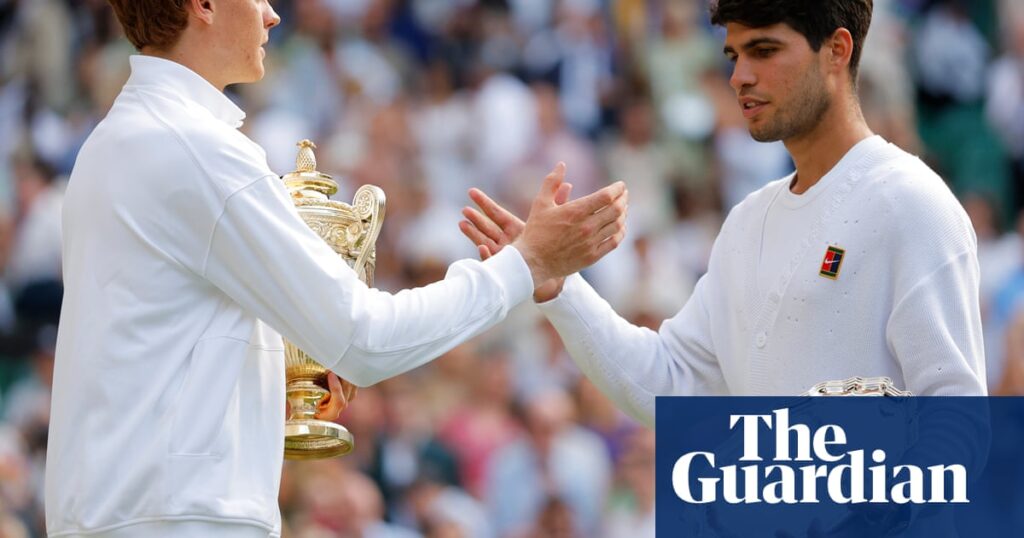First Jannik Sinner hit a wicked serve, straight down the T. Then he sank to his knees, head bowed as in prayer, in thanks and absolution. It was an appropriate gesture for the first Italian to win a singles title at Wimbledon. But it carried a deeper significance, too.
Five weeks ago in the French Open, Sinner had watched three match points come and go against Carlos Alcaraz, before losing a five-set, 5hr 29min epic against the Spaniard. After that match Sinner looked broken. Now, against the same brilliant opponent on Centre Court, he had mended his mind and soul.
“Even if I don’t cry, it feels emotional because only me and the people who are close to me know exactly what we have been through,” Sinner said after his enthralling 4-6, 6-4, 6-4, 6-4 victory. “It has been everything except easy.”
He had got over that defeat in Paris by adopting a stoicism that would have impressed Seneca, and by practising even harder. “Things can happen,” he said. “I believe if you lose a grand slam final that way, it’s much better than if someone kills you and you win two games. Then after you keep going, keep pushing.”
As he spoke it was impossible to escape the feeling of watching the changing of the guard. How could it not when we had just witnessed the first Wimbledon men’s final since 2002 without at least one of Novak Djokovic, Roger Federer, Rafael Nadal or Andy Murray being lauded and applauded?
Yet over three hours of exhilarating, nervy and at times breathtaking tennis, Sinner and Alcaraz assured Centre Court they were witnessing the smoothest of successions. The kings are dead. Long live the kings.
When Sinner was growing up, he didn’t idolise Federer or Nadel but the exuberant American skier Bode Miller. In fact, Sinner was good enough as a junior to be a national runner-up in the giant slalom, before focusing on tennis when he was 12. Yet having gone down mountains, he proved he was good at climbing them too.
The tone was set early in the first set with an 18-shot rally of staggering power and velocity. Each shot appeared harder, flatter, more uncompromising. Alcaraz won that battle but he was to lose the war.
There were times the Spaniard reminded Wimbledon of his instinctive brilliance. At set point in the first set, for instance, he somehow scrambled to his right to get back a howitzer forehand, before throwing himself to his backhand side as Sinner attempted the kill. Not only did Alcaraz make it, but his shot somehow went for a winner to go a set up.
As the Spaniard cupped his hand to his ear before raising it overhead, Centre Court rose to give him a standing ovation. It was Alcaraz in a nutshell: entertainer, counterpuncher, conjurer.
Sinner, though, is not the world No 1 for nothing. He broke immediately at the start of the second set, and when leading 5-4 he hit three extraordinary winners in a row to level the match. After one he raised his racket in the air like a gladiator asking for approval. Not only did Centre Court stand up in appreciation, but so did the legends of the game, including Björn Borg and Stefan Edberg, in the royal box. It was that good.
At 3-3 in the third set, it was so close that both players had won 80 points. But the Italian was growing in confidence and, thanks to his huge serve, looked in control. And when he broke towards the end of the third set, and again early in the fourth, the finish line was suddenly in sight.
after newsletter promotion
However, Alcaraz refused to lie down. In Paris he had looked down and out, only to perform an act of escapology worthy of Harry Houdini. He tried to repeat the trick, but this time Sinner ensured the locks were not only securely fastened, bolted, but he had thrown away the key.
Afterwards on Centre Court, Sinner also found the right words to sum up how far he had come. “Back in the days when I was young, this was only a dream of the dream, because it was so far away from where I am from. So I am just living my dream.”
He also paid tribute to his team for helping him to recover from Paris. “They keep pushing me to become a better tennis player, but also a better person,” he said, to warm applause.
The good news for tennis is that there should be many more of these epic tussles over the next decade. “If I’m honest, I don’t see any player having the level that we are playing when we face each other,” Alcaraz said afterwards. “And this rivalry, it’s becoming better and better. I think it’s great for us, and it is great for tennis.”
It is hard to argue. Sinner is 23. Alcaraz 22. Between them they have won 41 titles and nine grand slam championships, including the past seven between them. And for now, at least, they are light years ahead of the competition.
Same time, same place, next year, anyone?


